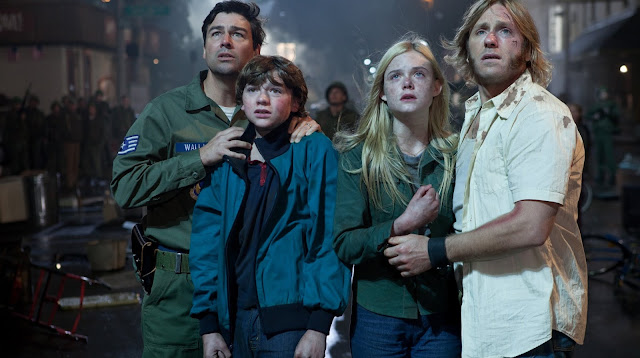Two 'ET' Homages Broke Out As Spielberg Stopped Making Kid-Targeted Fantasies
Greg Mottola's Paul and JJ Abrams' Super 8 broke out in 2011 because they paid homage to Spielberg's origins as the king of the family sci-fi movie, just as he moved into animation and period dramas
 |
| Elle Fanning leads 'Super 8' (CREDIT: Paramount) |
by Jack Linsdell
Steven Spielberg has arguably become the most definitive and well-known filmmaker to ever walk the earth, with a filmography packed with cult classics, box office record holders and Oscar winning dramas. He is the ABBA or Queen to movies - a catalogue filled to the brim with "hits" that have become ingrained in modern pop culture. During the 1970s and '80s, Spielberg made numerous family-friendly, fantasy-based science fiction movies, defining a whole new genre and cementing himself as a household name. Numerous films have ripped off and paid homage to the early Spielberg sci-fi hits over the years, but the success of two of them in 2011 became an ironic commentary on the new shift in direction for the filmmakers' career.
In 1977, Spielberg wrote and directed his cult sci-fi movie Close Encounters of the Third Kind. That Richard Dreyfuss-led flick earned a massive $306 million worldwide on a $19 million budget, which would be $1.3 billion if adjusted for inflation. It also recieved a bunch of Oscar nominations too. Five years later, Spielberg's ET: The Extra-Terrestrial broke out even bigger ($792 million on a $10 million budget) surpassing Star Wars to become the highest grossing movie of all time. It's iconic ending has forever given it a place in film history and made it the target of several successful reissues over the years. Both films expertly played on our fears, fascinations and curiousties with the extra terrestrial and captured the sense of wonderment we experience as children in their young protagonists, both big components of their exponential success.
In 2011, two mid-budget sci-fi flicks respectively and passionately homaged those two early Spielberg classics (that helped define him as the king of the fantasy blockbuster), and broke out because of it. In the February, we had Greg Mottola's adult comedy Paul starring and written by Nick Frost and Simon Pegg. That $40 million flick explicitly sold itself as a direct parody of Spielberg's science-fiction films, using it as a great source of comedy whilst playing to nostalgic adults who'd grown up with the likes of ET. All this was wrapped in an R-rated, star-studded (Jason Bateman, Sigourney Weaver and Seth Rogen as the voice of Paul) package that clicked with audiences to the tune of $100 million worldwide.
June gave us JJ Abrams' underrated and very enjoyable kids fantasy Super 8. Capturing the tone, aesthetic and thematic content of films like The Goonies and ET, this Joel Courtney/Elle Fanning flick was a direct Spielberg homage that appealed equally to nostalgic adults and their young kids as that summer's big fantasy blockbuster. However, the involvement of Spielberg as a producer and having the Amblin logo attached to the opening reels, turned Super 8 into a cinematic event. It's "a Spielberg homage produced by Spielberg!" hook combined with the earned goodwill of director JJ Abrams for making crowd-pleasing fantasies like Lost and Star Trek, catapulted Super 8 to an impressive $260 million worldwide on a mere $50 million budget.
Both Paul and Super 8 broke out in 2011 because they tapped into the nostalgia around, and popularity for, the sci-fi cult classics that launched Spielberg's film career like Close Encounters. But, they offered enough "new" elements (for Paul it was big stars having fun in an R-rated comedy, whilst Super 8 was a darker interpretation of the thematics behind the likes of ET) to justify themselves as appealing modern movies too. Anyway, their success came at a time when Spielberg's career was starting to shift away from the escapist fantasy blockbusters and into more kid-targeted animated flicks and adult-skewing period dramas, making them very ironic commentaries.
That year, Spielberg directed the animated blockbuster The Adventures of Tintin (which ironically starred Frost and Pegg in supporting roles) and the WWI drama War Horse. These movies marked a big shift in the audiences Spielberg targeted. From 2011 onwards, Spielberg moved away from the families and younger kids. He would go on to make animated movies (The BFG, Ready Player One) that would target older children and push the boundaries of motion capture technology and sophisticated period dramas (Lincoln, Bridge of Spies, The Post) whose darker, political examinations chased an older, adult audience. He would achieve great success with both as Tintin earned $374 million worldwide on $135 million budget whilst War Horse grossed $177 million on a $66 million budget. However, with 2011 being the year that Spielberg started making different movies for different audiences, it's very ironic that the success of both Paul and Super 8 that year was because they homaged the exact movies that he was transitioning away from.
Both Super 8 and Paul work brilliantly as modern day homages and celebrations of the classic Spielberg science-fiction flicks of the 70s and 80s. They broke out (in relation to budget and expectation) arguably because they reminded audiences of their love for the early escapist fantasy blockbusters that Spielberg originally specialised in. However, they were released at a time when Spielberg was transitioning away from making the very type of movies they were directly homaging, making their commercial success even more ironic. And in 2020, when that transition has long since been completed, both Paul and Super 8 feel even more "special".


Comments
Post a Comment